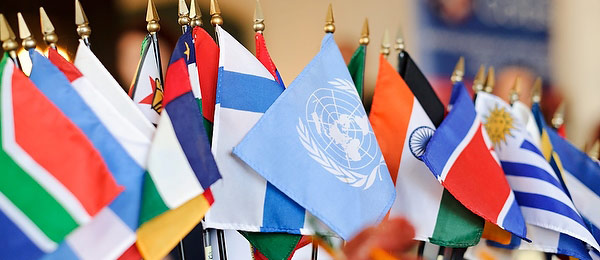“Competence, like truth, beauty, and contact lenses, is in the eye of the beholder,” Laurence J. Peter, an educator and author of The Peter Principle, once wrote.
That saying, however whimsical, may hold some truth when it comes to a buzz phrase in education: global competence. What does it mean to be globally competent? It means different things to different people, it evolves, and it may never be fully attainable. But in an increasingly connected world, this much is certain: awareness of the world and people around us is more important than ever.

UW–Madison has made significant strides in bringing the world to the campus and making opportunities more accessible for students. More than two thousand UW students earned academic credit outside of the U.S. in the 2013–14 academic year, marking an all-time high. The UW remains a top producer of Peace Corps volunteers, ranking second in the nation. And the UW sits among the top twenty-five universities for its number of international students.
Still, some students choose not to study abroad or travel internationally. Cost, comfort, and academic scheduling can all be barriers to exploring the world as an undergraduate. But fortunately for these students, they may not have to go far to develop global and cultural competencies.
“We can all agree that maybe the greatest impact is immersing yourself in another culture, in another country, where the language, people, and culture are all around you,” says Marianne Bird Bear, assistant dean of the International Division. “But I don’t think that it’s necessary. Particularly on this campus, there are the opportunities to develop a certain level of global competency without ever leaving the country.”
Badger Parent sat down with Bird Bear, who’s been involved with international initiatives at the UW for more than twenty years, to explore global competence. Bolded below are the lessons we learned, followed by excerpts from our interview.
Definitions and emphases of global competence can vary greatly.
Marianne Bird Bear: Global competence is vague and an umbrella term in some ways, but it’s really the knowledge, skills, and attitudes that you need to thrive in a global environment, marketplace, or the world today.
People find some parts more important than others. I find that it’s the attitude that’s so important — the willingness to try to see things from other people’s perspectives. Working with people from different cultures. Working across linguistic and language barriers, whether that’s learning another language or just being really open to trying to understand people if English isn’t their first language.

Cultural competence can be as important as global competence — and even more so in Wisconsin.
MBB: More and more, I think of global competency as culturalcompetency, which expands the domestic and the international. You can learn a lot about cultural competence by interacting with American Indian tribes in our state and going to the student powwow every spring. And that’s no less important than learning about Mexico or Brazil. One might argue that if you live in the state of Wisconsin, it’s more important.
Developing global competence is a lifelong process, not something you can necessarily master, study, or learn in a lecture.
MBB: I don’t know that everyone feels the same way, but that’s my perspective. I’m a little uncomfortable with the idea that it’s something you can fully be or complete. I think if we say, “I’m globally competent,” then we can sit back and not continue to learn. As the world changes and relationships between countries shift, that has to be continual. And as we mature — as we’re influenced by different things in our life here — it can change how we think about the world.
I think it’s empathy — continually putting yourself in other people’s shoes, continually trying to seek the perspective of others. It’s not enough to be empathic; you can be empathetic and not have global competencies. But it’s the combination of understanding other parts of the world, other languages, and other people in societies, and having that empathy to ask yourself about other perspectives on situations.
I’ve traveled a lot, I’ve lived in other countries, I’ve learned other languages, and I was surrounded by foreign exchange students as a young person. But I wouldn’t feel comfortable saying, “I’m globally competent.” I’d say, “Yeah, I have a global skillset.”
Nothing can parallel studying or traveling abroad, but the UW offers a wide range of academic opportunities with international ties.
MBB: We think a lot about this. There is so much available on campus:
- Courses across disciplines with international case studies or international content.
- International majors, including an international business major.
- Certificates, including international engineering, Middle East studies, European studies, and global health.
- Foreign languages in the traditional classroom.
- Summer intensive language program, where all day long, you’re doing activities inside and outside the classroom focused on learning a particular language. So if it’s Arabic, you’ll have in-classroom instruction, and you then might meet with a group of native Arabic speakers, you might do a cooking course in Arabic, you might watch TV in Arabic that night.
- Summer immersion language program, where you learn another language while living in a residence hall and are expected to communicate in the target language exclusively for the duration of the program.
- Noncredit language programs, available through the Division of Continuing Studies.
- Faculty experts across the social sciences and humanities for almost every region of the world.
- International Learning Community, which has floors in university residence halls that are made up of native speakers and students learning a certain language. They have a graduate student assistant living among them who’s very focused on the culture and language.
- Internships where students work in the United States, but with an international focus, sometimes for an NGO [nongovernmental organization].
- Area studies programs [within the Institute for Regional and International Studies] that focus on eight different regions of the world and offer weekly brown bags, lectures, student advising, and outreach activities.
- Student organizations and cultural events. Just a few weeks ago, there was a huge Diwali celebration, which is the biggest of all Hindu festivals. There was a rally in support of the students from Missouri. The Multicultural Student Center has tons of programming.
I honestly think that on any given day on this campus, you can find at least five activities with a distinct international content or focus.
Small gestures go a long way: students can gain a wealth of knowledge by interacting with individuals from different backgrounds.
MBB: A tenth of our students are international. I think that if we could find ways to better engage our international students, there’s a lot of learning that could happen. Make friends with somebody from another country. Try to think of things from their perspective. Hear about what education is like in their country, what their life is like.
There are programs that students can join, like the BRIDGE [Building Relationships in Diverse Global Environments] program run by International Student Services, which partners domestic and international students. But it’s also just looking around in your classroom and talking to people who may be from another country.
Despite the untold benefits of interacting with people from different backgrounds, barriers persist.
MBB: I know from my own experiences living overseas, I was thrilled when local students wanted to talk to me. There’s just sort of this wall, and it’s hard to get across. But it was thrilling when a French student would say, “Hey, where are you from? What are you doing here? Do you want to work on a project together?”
I thought a lot about this when I worked at the College of Engineering. There was a little bit of grumbling about, “Oh, I can’t understand my TA.” I would think, “But that person knows so much! They can share so much.” What if the TA on the first day came in and said, “I’m from Japan. This is what education was like there. And this is why I came to this country.” What if they could walk in and bring their whole self? So much learning could happen between a TA and a student.
Everyday experiences, such as sampling different types of art, film, and music, can also prompt students to think deeply about other cultures.
MBB: You probably know people who say, “Oh, I’m not going to watch a film if I have to read subtitles.” Well, they’re missing so much! International films are a great way to get insight into another culture. The Chazen [Museum of Art] has numerous international exhibitions. We could probably talk all day if I sat and thought about all of the opportunities we have — many of them free.
—Interview conducted, edited, and condensed by Preston Schmitt
Characteristics of a Globally Prepared Citizen
During UW–Madison’s 2009 reaccreditation process, the formal means of assuring accountability and improving quality of U.S. colleges and universities, a committee of faculty, staff, students, and alumni set out to define the characteristics of a global citizen. The committee identified the following attributes.
- Critical thinking and action: acts on informed decision-making on local and global issues, asks questions to better understand the cultural, political, [and] economic contexts impacting all sides of issues, and works in collaboration with others.
- Intercultural competence and sensibility: respects all cultures, communicates with diverse audiences across cultures and languages, understands religious [and] ethnic customs that shape the opinions and actions of others from backgrounds different than one’s own.
- Economic competitiveness and the ability to thrive: ethical and effective work in the global marketplace; ability to balance free-market opportunities with an understanding of global interdependency.
- Understand and act upon interdependency between local and global communities: understands interdependency, respects and recognizes global relationships, sees the link between global and local issues, and respects the importance of each.
- Ethical and socially responsible: measures conduct of individuals and governments by effect on others, seeks win-win opportunities, demonstrates honesty and fairness, recognizes unequal distribution of resources, engages in public service to make the world a safer and better place.
- Open and adaptive to change: learns from others’ ideas, knowledge, practices, and systems; views issues from different perspectives; shares “best practices;” accepts change as inherent to a globalized world.
- Ability to appreciate and guide sustainability and the use of Earth’s resources without harming future use: recognizes impact of shrinking resources, understands a responsibility for ethical resource stewardship, pursues sustainable win-win economic strategies, incorporates limitations and constraints in long-range planning.
- Solid foundation of personal characteristics, qualities, and behaviors: demonstrates broad cultural literacy and confidence in multicultural situations; exhibits a desire for lifelong learning; demonstrates respect, humility, [and] tolerance toward others; educates self on global cultures, beliefs, [and] religions as needed; assesses accurately one’s own inner resources, abilities, and limits.